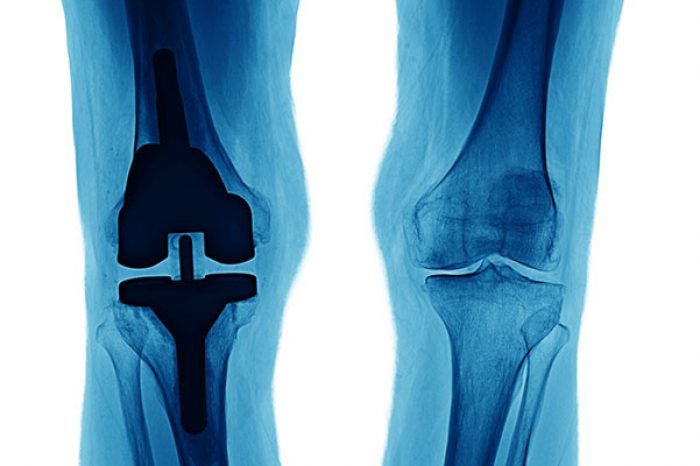
Recently we have seen more patients with questions about whether prolotherapy or platelet-rich plasma (PRP) is a better option for their knee osteoarthritis. Luckily for us there is data comparing these to treatments. Let’s dive in.
Osteoarthritis or OA is a chronic joint disease that is progressive and can lead to pain, stiffness, swelling and decreased knee motion. Almost 80% of Americans over the age of 65 suffer from osteoarthritis.
Traditional treatments range from medication management (i.e. anti-inflammatory medications, topical creams, Tylenol), physical therapy, bracing and surgery.
Prolotherapy for knee OA involves injecting an irritant solution into the damaged joint. In most cases, this is hypertonic dextrose or sugar water. The exact mechanism of prolotherapy in the joint is not well understood [Hauser et al, 2016].
PRP stands for platelet rich plasma and is an injection that is created by concentrated a patient’s own platelets. The molecular mechanism of PRP and its efficiency in knee OA have been the point of focus in clinical studies.
In knee arthritis, cartilage damage is though to lead to inflammation, and inflammatory plays a role in the progression of OA. PRP is thought to influence the progression of arthritis though the growth factors and the anti-inflammatory of platelets, although the precise mechanisms remains unclear [Belk et al, 2020; Andia & Maffulli, 2013; Andia & Maffulli, 2018; Andia et al, 2018].
A number of studies have evaluated prolotherapy for knee OA, but in general the evidence is of low quality. Various guidelines have emerged recommending against dextrose prolotherapy. In the 2019 American College of Rheumatology/Arthritis Foundation Guideline for the Management of Osteoarthritis of the Hand, Hip, and Knee, the use of prolotherapy was conditionally recommended against in patients with knee OA [Kolasinski et al, 2019]. Likewise, the Osteoarthritis Research Society International (OARSI) guidelines strongly recommended against dextrose prolotherapy due to extremely-low quality evidence [Bannuru et al, 2019].
Despite these guidelines against dextrose prolotherapy, clinical trials of prolotherapy have suggested positive benefits of using prolotherapy for knee OA [Sit et al, 2016; Rabago & Nourani, 2017; Sert et al, 2020; Eslamian & Amouzandeh, 2015; Rabago et al, 2019; Sit et al, 2020].
There are three studies that have compared dextrose prolotherapy against PRP.
In this study by Rahimzadeh et al. in 2018 a total of 42 patients with mild knee OA were enrolled in a randomized, double-blind clinical trial. A double-blind, randomized controlled study attempts to eliminate any bias by preventing either the patients and the physician from knowing what was injected into the knee and then measuring the effects of the injection on pain and function. In this study, 21 patients received a PRP injection and or 21 patients received a prolotherapy injection.
Patients received 2 injections of either PRP or a 25% dextrose prolotherapy injection. The protocol for the PRP procedure likely produced a low dose PRP product, but despite this limitation the PRP therapy was more effective than prolotherapy in reducing pain and function.
In this study, 60 consecutive patients with mild to moderate knee arthritis were randomized to in a placebo-controlled study into 3 groups: a prolotherapy group, PRP group and saline injection group. The prolotherapy group received 3 dextrose prolotherapy injections in 3-week intervals using landmark guidance (i.e. no ultrasound was used to confirm the injection location). The injections targeted the knee joint with 6 mL of solution and surrounding ligaments. The concentration of prolotherapy was not reported. The PRP group also received 3 injections spaced 3 weeks apart. This trial found that while both platelet-rich plasma and dextrose prolotherapy resulted in improvement pain and function, the improvement was not significant in either group.
One significant limitation of this study is that the PRP dose was also not reported.
The randomized clinical trial by Pishgahi et al enrolled 92 patients and found no significant improvement in pain and functional scores in those treated with 50 % dextrose prolotherapy. Patients treated with platelet-rich plasma, however, demonstrated a significantly improvement in pain and function scores at the 6-month follow-up compared to baseline.
Both the 2018 study by Rahimzadeh et al and the 2020 studies determined that the pain and functional improvements seen in the platelet-rich plasma groups were significantly better compared to the dextrose prolotherapy groups.
Meniscus tears are one of the most common causes of knee pain in active adults and aging athletes alike. If you’ve been told you have a “degenerative meniscus tear,” you may have also heard that surgery isn’t always the
Read MoreFor patients with chronic adductor longus tendinopathy, a newer option is emerging: ultrasound-guided tenotomy using the Tenex system. Recent clinical evidence suggests this minimally invasive approach may effectively
Read More